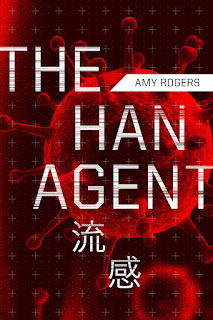Today's post is by guest blogger Amy Rogers, scientist, publisher and novelist, who just released her latest medical thriller, The Han Agent.
When I was a kid, I got the chicken pox. In those days before the vaccine, this was a milestone in a child’s life. Once you survived the pox, you didn’t have to worry about getting it ever again. A single episode of this infection taught your immune system how to recognize the chicken pox virus and fight it off. For most people, this immunity lasts for life. Lots of naturally acquired immunity is like that. And most vaccines work for a long time. For example, you only need a tetanus shot every ten years.
So why should you get a flu shot every year? Are those evil drug companies just out to make a buck?
No. Blame the biology of influenza, the virus that causes the flu.
Influenza is highly changeable. It’s constantly mutating a little bit here and there. Small mutations in the virus’s two major identifying marker proteins, or antigens, are like a disguise. Your immune system is on the alert, watching for flu, but it fails to recognize the altered virus. Each year, each flu season, a slightly different version (actually several different versions) of the virus naturally appear and circulate around the globe. Your existing immunity against last year’s, or last decade’s, flu might not be enough to protect you this time.
Therefore, scientists keep an eye on influenza viruses in the wild year-round as they try to predict which versions are most likely to cause the next winter’s flu. Based on those predictions, vaccine manufacturers produce a cocktail of antigens for their seasonal flu vaccine.
A genetically engineered pandemic flu virus is at he heart of Amy's latest medical thriller, The Han Agent, defined "exciting as it is frighteningly realistic" by James Rollins, #1 New York Times bestselling author of Sigma Force series, and "absolutely chilling” by Barry Lancet, award-winning author of The Spy Across the Table and Tokyo Kill.
Amy Rogers, MD, PhD, is a Harvard-educated scientist, novelist, journalist, educator, critic, and publisher who specializes in all things science-y. Her novels Petroplague, Reversion, and The Han Agent use real science and medicine to create plausible, frightening scenarios in the style of Michael Crichton.
Get The Han Agent on Amazon, Barns and Nobles, Kobo, or iBooks.

